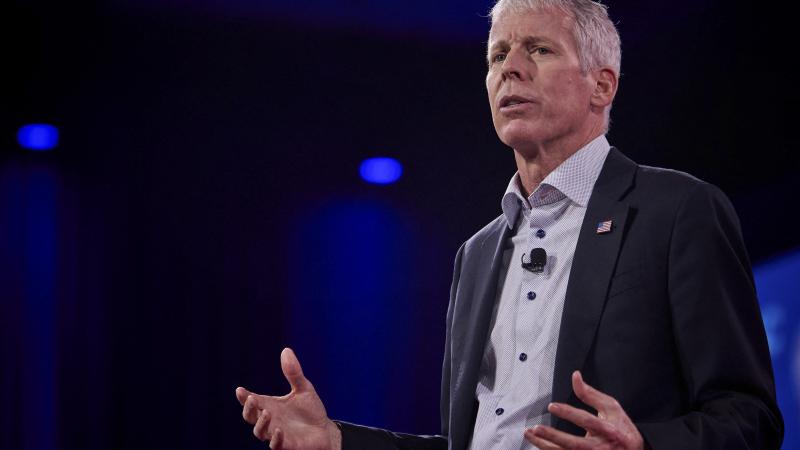New documentary features scientists who risked challenging the ‘climate crisis’ narrative
"Climate The Movie: The Cold Truth" interviews scientists who say, but challenging the dominant narrative on climate change, they've faced professional repercussions.
In 2021, physicists Henrik Svensmark and Nir Shaviv published a peer-reviewed study in the scientific journal Scientific Reports that found that cosmic rays and solar activity impact cloud cover, which in turn impacts climate patterns.
Though the study had a narrow focus on this one area of natural variability, the implication of the findings is that carbon dioxide emissions aren’t the sole driver of global warming. Svensmark and Nir Shaviv say that didn’t sit well with the scientific community.
Typical story
In a new documentary directed by Martin Durkin, “Climate The Movie: The Cold Truth,” Svensmark and Shaviv talk about what happened after the paper was published.
“So many instances of people doing really nasty things,” Svensmark said. “When I applied for a job, a group of scientists writes to the university saying they shouldn’t hire me. And that’s a typical story, unfortunately.”
Shaviv said he was treated as if he had leprosy.
Dr. Sallie Baliunas, an astrophysicist who researched solar variability and its impact on climate change, said in the film that she chose to retire after facing hostility from peers. “My family said I should have retired even sooner, years sooner. So they noticed the toll. It took a toll on them and me,” she said.
Tom Nelson, the documentary’s producer, told Just The News that the blowback Baliunas and her colleague, Dr. Willie Soon, an astrophysicist and aerospace engineer, received is common for those who explore these research topics.
“You can kind of feel the emotion as she's talking about it. It's just pretty sad that she got phased out of science,” producer Tom Nelson told Just The News.
The documentary features interviews with many other researchers who challenge the dominant narrative that carbon dioxide is the main driver of a warming trend and that it’s producing an existential threat to people.
The movie explores how scientists who question that narrative face professional repercussions. Research, according to the scientists interviewed in the documentary, depends heavily on government funding, and scientists risk their funding if they question the “climate crisis.”
Since its release on March 20, it's been shared widely on multiple platforms. Wide Awake Media posted a copy of the movie on X, which has 1.1 million views as of March 29.
'Appallingly bad' science
Dr. John Clauser, recipient of the 2022 Nobel Prize in Physics, disputes the idea that the science on climate is settled. “The science being done is appallingly bad. There are a large number of scientists who are in violent disagreement,” Clauser said.
Clauser said that since he no longer has to worry about a job or funding his work, he freely calls himself a “denier.”
While climate science is regularly presented as having a consensus with no legitimate challenge, the documentary features a number of highly credentialed and accomplished scientists, like Clauser, who argue that there is a lot of dissent in the scientific community.
These voices, however, are marginalized, which minimizes their visibility.
Scientific dissent
The film also challenges a number of beliefs about temperatures and carbon dioxide levels of the past few decades being unprecedented. According to the scientists interviewed in the documentary, for most of the Earth’s history, temperatures have been much warmer than they are now, and carbon dioxide levels have at times been several times higher.
“We are in a remarkably cool period. If we look over the last 550 million years. In fact, only one other time period in that last 550 million years was the temperature as cool as it is now,” Dr. Matt Wielicki, former assistant professor in the Department of Geological Sciences at the University of Alabama and author of “Irrational Fear,” said.
Wieilicki told Just The News that the documentary does a good job of presenting the scientific challenges to the “climate crisis” narrative. While it does get sensational at parts, Wielicki said that’s kind of expected in a documentary that’s trying to hold attention on a complex topic like climate change.
“It's nice to see some common sense, and a little bit more positivity brought to this whole discussion, as opposed to people, you know, sticking themselves to roadways,” Wielicki said.
Wielicki left teaching largely over the vitriol he said he received for his views on climate change and diversity, equity and inclusion.
The film proposes that climate change became a popular narrative because it generates a lot of funding for companies and researchers, and since so many jobs depend on maintaining the belief there’s a serious crisis to be solved by the projects being funded, those who benefit from the money resist any challenges to the narrative.
The issue is also attractive to politicians, the film’s subjects argue, because policies to address climate change impact so many aspects of our lives — the cars we drive, the foods we eat, the clothes we wear — that it’s attractive to politicians seeking more power.
The documentary argues that the climate change issue is a way to advance a modern anti-capitalism movement. Whereas anti-capitalist rhetoric once relied on the argument that capitalism creates and maintains poverty, the narrative now is that humans consume too much.
Viewership
Nelson said the documentary was supported entirely with private funding, and it had a small budget.
Anticipating that a film of this nature would be targeted for removal or suppression, the filmmakers have offered it for free. Multiple people are posting on different platforms, including Vimeo and X, in hopes that it will be available somewhere should some copies get removed.
The filmmakers held premiers in London, the Netherlands, and in Virginia. Nelson said the theaters were packed, and climate activists didn’t attempt to shut it down.
Some critics have taken aim at the film. Dr. Eliot Jacobson, a retired mathematics professor, attempted to organize a reporting campaign to get the movie removed, which appears to have been unsuccessful.
Dutch journalist Maarten Keulemans wrote an extensive thread rebutting points made in the film, and Chris Martz, a junior in the Millersville University meteorology program, posted an extensive thread addressing Kuelemans' points.
Nelson said he expects to see more pushback as the movie receives wider viewership, but for now, he’s happy that it’s contributing to the discussion on these issues.
“We're telling the truth, and it's against the narrative. So, we're gonna get blowback. But telling the truth is the right thing to do,” Nelson said.
















